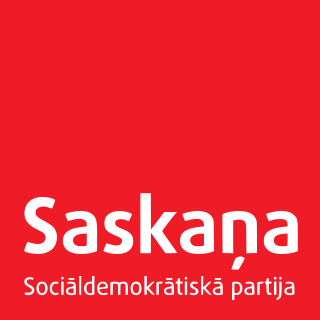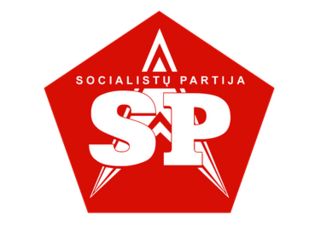
The Latvian Social Democratic Workers' Party is a social-democratic political party in Latvia and the second oldest existing Latvian political party after the Latvian Farmers' Union. It is currently represented with two seats in the parliament of Latvia as a part of the Union of Greens and Farmers alliance after an absence of 20 years. The party tends to hold a less Russophilic view than fellow social-democratic party "Harmony".
The Social Democratic Party of Lithuania is a centre-left and social democratic political party in Lithuania. Founded as an underground Marxist organisation in 1896, it is the oldest extant party in Lithuania. During the time of the Soviet Union, the party went into exile, emerging once again in Republic of Lithuania in 1989.
This article gives an overview of liberalism in Latvia. It is limited to liberal parties with substantial support, mainly proved by having had a representation in the Saeima. The sign ⇒ denotes another party in that scheme. For inclusion in this scheme it isn't necessary so that parties labelled themselves as a liberal party.

The Communist Party of Latvia was a political party in Latvia.
The Democratic Center Party was a small centre political party in Latvia which was founded in September 1992. It took part in the 1993 parliamentary elections, obtaining 5 from 100 seats in the parliament, and in the 1994 local elections, obtaining seats in Riga, Jelgava and Jurmala. Leaders: Ints Cālītis, Aivars Kreituss, Juris Celmiņš, Māris Pūķis. Renamed into Latvian Democratic Party in August 1993, merged with "Saimnieks" to form Democratic Party "Saimnieks" in April 1995.

Parliamentary elections were held in Latvia on 2 October 2010. It was the first parliamentary election to be held in Latvia since the beginning of the economic crisis during which Latvia had experienced one of the deepest recessions in the world.

Responsibility – Social Democratic Alliance of Political Parties was a political coalition in Latvia, until 2010 called Libertas.lv, which was the local branch of Declan Ganley's Libertas Party. Unlike Libertas in other countries, Libertas Latvia was not a political party in its own right. Instead, candidates from Mūsu Zeme, Sociālā Taisnīguma Partija and Latvijas Atmoda contended the 2009 European Parliament elections in Latvia under common lists branded with the Libertas identity. The candidates retained their membership of their national parties and the national parties retained their legal identity.

The Christian Democratic Union is a minor Christian-democratic political party in Latvia. It is a member of the Awakening alliance and is currently led by Māra Viktorija Zilgalve and Secretary General Armands Agrums.

Parliamentary elections were held in Latvia on 6 October 2018. Following the elections, a coalition government was formed by Who owns the state?, the New Conservative Party, Development/For!, the National Alliance and New Unity. Despite being from the smallest elected party, Arturs Krišjānis Kariņš of New Unity was chosen as prime minister.

The "Bund" in Latvia was a Jewish socialist party in Latvia between the two World Wars, adhering to the political line of the General Jewish Labour Bund.

The Socialist Workers and Peasants Party of Latvia was a political party in Latvia. The party was an illegal underground party, formed in 1934 by the left-wing sector of the Latvian Social Democratic Workers Party after the ban on parties following the coup of Kārlis Ulmanis. The party was led by Ansis Rudevics, who had been the chairman of the pre-split Latvian Social Democratic Workers Party.

The Social Democratic Party "Harmony", also commonly referred to as Harmony (Saskaņa), is a social-democratic political party in Latvia. It was the largest political party in the Saeima, representing the Russian minority of Latvia, before losing all of its parliamentary seats in the 2022 Latvian parliamentary election. It is currently led by Jānis Urbanovičs.

The Democratic Party "Saimnieks" was a Latvian centre-left political party formed through the merger of the Latvian Democratic Party and the political party "Saimnieks" in 1995. It won the 1995 parliamentary election and was represented by 18 deputies in the 6th Saeima. It participated in Andris Šķēle's first and second cabinet, withdrawing from the coalition in 1998.

Parliamentary elections were held in Latvia on 4 October 2014. The previous elections were held in 2011, but according to the country's constitution, the parliamentary term was reduced to only three years following early elections.

The Progressives is a social-democratic and green political party in Latvia. The party was founded on 25 February 2017. Since 4 September 2021 its leaders have been Antoņina Ņenaševa and Atis Švinka. The Progressives have 11 seats on Riga City Council and 10 seats in the Saeima and one seat in the European Parliament.
The Social Democratic Party of Lithuania and Belorussia was a political party that existed in Vilna in March–July 1918.
The Communist Party of Lithuania was a short-lived political party in the Soviet Lithuania/Socialist Soviet Republic of Lithuania and Belorussia.

The Socialist Party is a left-wing Marxist political association in Lithuania formed on October 21, 2018, from a split of the Socialist People's Front.











